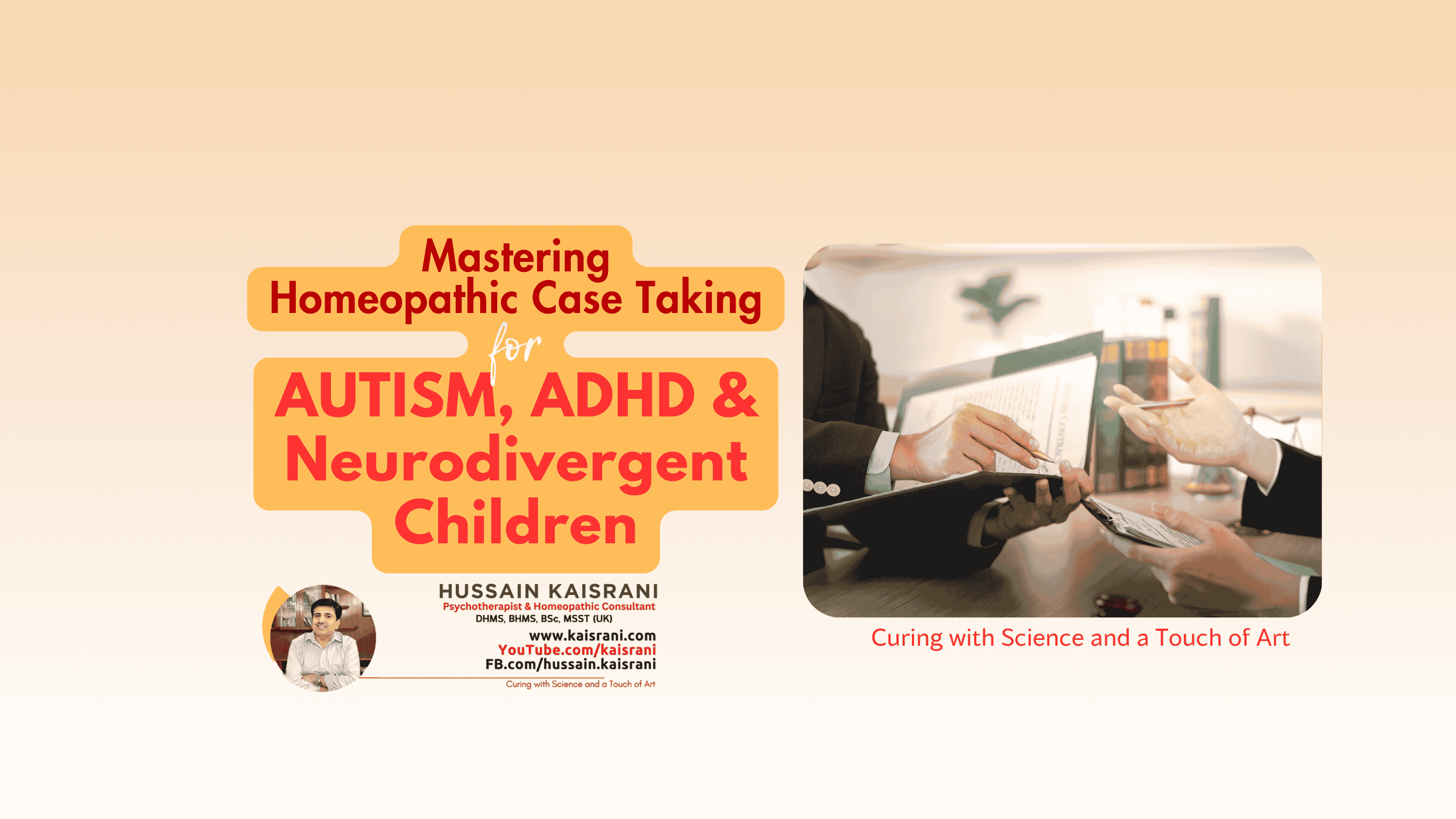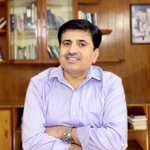Mastering Homeopathic Case Taking for Autism, ADHD, and Neurodivergent Children
A Practical Framework for Complex Cases by Dr. Hussain Kaisrani
About the Speaker: Dr. Hussain Kaisrani
Dr. Hussain Kaisrani is a renowned homeopathic physician with over 20 years of clinical experience. He is the Director of Hussain Kaisrani Homeopathic Consultancy and is widely recognised for his expertise in managing complex psychological and neurological conditions. Dr. Kaisrani has a special interest and a proven track record in successfully treating children on the autism spectrum, as well as those with ADHD (Attention-Deficit/Hyperactivity Disorder), ADD (Attention Deficit Disorder), ODD (Oppositional Defiant Disorder) and other learning differences. His approach is deeply rooted in classical homeopathy, enriched by a modern understanding of neurodiversity. For more insights and cases, visit his official website: www.kaisrani.com.
Introduction: Embracing the Neurodivergent Spectrum
My journey with neurodivergent children began with challenges. After initial failures in managing autism, I immersed myself in deeper research, attended seminars, studied cases and most importantly, learned from the children themselves. A vital understanding, I came into was : we are not dealing with a single illness, but a spectrum of neurodiversity.
This spectrum includes:
- Autism Spectrum Disorder (ASD) – from mild to severe, with or without intellectual impairment.
- ADHD (Attention-Deficit/Hyperactivity Disorder) – the hyperactive and impulsive type.
- ADD (Attention Deficit Disorder) – the inattentive type, often quieter but struggling to focus.
- ODD (Oppositional Defiant Disorder) – a pattern of angry, defiant and vindictive behaviour.
- Dyslexia & other Learning Difficulties.
The critical question for us as homeopaths is: How do we analyse this diverse range of presentations? The answer lies not just in theory, but in a meticulous, insightful, and holistic approach to case taking. We will move beyond labels and learn to see the unique individual behind the diagnosis.
The Foundational Pillars of Case Taking
1. The Decisive Role of Family History & Miasms
In homeopathy, family history is a roadmap to the constitutional remedy. It reveals the inherited miasmatic predisposition that shapes the child’s health.
- Strong Cancer History: Where multiple close relatives have/had cancer, a single dose of Carcinocinum 1M can be a profound first prescription, clearing the inherited terrain.
- Diabetes Dynasty: When diabetes runs deep in the family (“چار چچا، دو خالائیں، دادا دادی سب کو ذیابیطس تھا”), Carcinocinum is again a prime candidate, addressing the underlying sycotic or tubercular tendency.
- Early Heart Disease: A history of heart attacks or severe heart disease in relatives under 50 strongly points to Medorrhinum.
- Consanguinity (Cousin Marriages): This is a crucial factor in Pakistani and Muslim cultures. When parents are close cousins (خالہ کی بیٹی، پھوپھی کا بیٹا، چچا کی بیٹی), the genetic load is intensified. Medorrhinum is very often the key initial prescription to address this.
2. The Pregnancy Narrative: The First Nine Months
The intrauterine period is formative. We must investigate:
- Emotional State: Was the mother under severe stress, grief, or anxiety? This can predispose the child to a nervous temperament.
- Physical Trauma: Were there any falls, accidents, or significant illnesses during pregnancy?
- Medications & Interventions: Any strong allopathic drugs, hormonal treatments, or complications?
- COVID-19 Impact: For “COVID babies,” we must ask about maternal infection, stress, and the subsequent environment of lockdowns and increased screen exposure.
3. Past Medical History: The Story of Causation
The child’s own medical history often holds the “why.”
- Vaccination Reaction: Was there a high fever, convulsions, or a dramatic change in behaviour and development after vaccination?
- Head Injuries: Very common in active ADHD and autistic children. A head injury can be a clear causative factor (Causation) for a remedy like Natrum Sulphuricum or Arnica.
- Severe Infections: A history of repeated, severe antibiotic-treated infections can suppress the immune response and alter the vital force.
4. The Window of Sleep
Sleep offers an unfiltered view of the unconscious vital force.
- Position: Kneel-chest position (like a praying Muslim) may indicate Medorrhinum or Syphilinum. Arms flung back can suggest Tuberculinum.
- Restlessness: Grinding teeth (Bruxism), jerking, sweating on the scalp – all are golden symptoms.
- Terrors & Talking: Night terrors, sleepwalking, or frequent waking provide deep constitutional insights.
The First Consultation: Unfolding the Unique Story
The Opening Question: “When Did You First Notice?”
This question separates two crucial pathways:
- Regressive Autism/ADHD: “She was talking, making eye contact, and then after her first birthday/MMR vaccine, she just… disappeared inside herself.” This points to remedies like Carcinocinum, Thuja or Silicea.
- Early-Onset/Congenital Traits: “He never made eye contact as a baby, was a very quiet infant, never responded to his name.” This suggests a deeper constitutional state from birth, requiring remedies like Baryta Carbonica, Calcarea Carbonica, or Medorrhinum.
Analysing Core Symptoms: Beyond the Label
For Autism & Sensory Issues:
- Sound Sensitivity: Don’t settle for “fear of noise.” Is it sudden noise (e.g., pressure cooker, ad break on TV) indicating Borax or Theridion? Or is it a specific, overwhelming sensory processing issue where the child covers ears even in quiet moments?
- Visual Stimming: “She stares at the fan for a long time.” This is a classic autistic trait. Does she also flick fingers in front of her eyes? Is she fascinated by spinning objects? This is crucial for remedies like Stramonium or Tarentula.
- Lack of Social Engagement: No social smile, preference for objects over people, delayed or absent speech.
For ADHD & Impulsivity:
- The “Climber”: “She has no sense of height or fear. She climbs on sofas, tables, and shelves. She seems fearless.” This recklessness is a hallmark of hyperactivity and points to remedies like Tuberculinum, Veratrum Album, or Medorrhinum.
- The “Noise-Maker”: “He makes sounds all day long.” This constant vocal stimming or humming can be a keynote for Cina, Tarentula or Hyoscyamus.
- The “Stretcher”: “She keeps stretching her body constantly.” This peculiar physical gesture is a valuable symptom.
For ODD & Behavioural Challenges:
- The “No” Response: A pattern of defiant and angry behaviour. Is it a response to frustration (ADHD-related) or a deep-seated, vindictive anger? Remedies like Chamomilla, Tuberculinum and Lycopodium come into play here.
The Modern Homeopath’s Secret Weapon: Ask for Videos!
A child in a clinical setting is often not their true self so they might be overwhelmed, shy or on their “best behaviour.”
My strongest advice: Politely insist that parents send you 2-3 short, casual videos of the child at home.
This allows you to witness firsthand:
- The tip-toe walking.
- The hand-flapping or spinning.
- The nature of their vocalisations.
- Their interaction with siblings and parents in a natural environment.
This visual evidence is often more revealing than an hour of questioning and is indispensable for an accurate prescription.
Conclusion: The Path to Healing is a Partnership
Treating neurodivergent children is a journey of patience, observation and deep empathy. It requires us to be detectives of the human spirit. By combining the timeless principles of homeopathy – miasmatic understanding, totality of symptoms and individualization – with a modern, culturally sensitive approach to case taking, we can find the key remedy that resonates with the child’s unique being. This is not just about managing symptoms but it is about unlocking their innate potential for connection, calm and joyful development.

